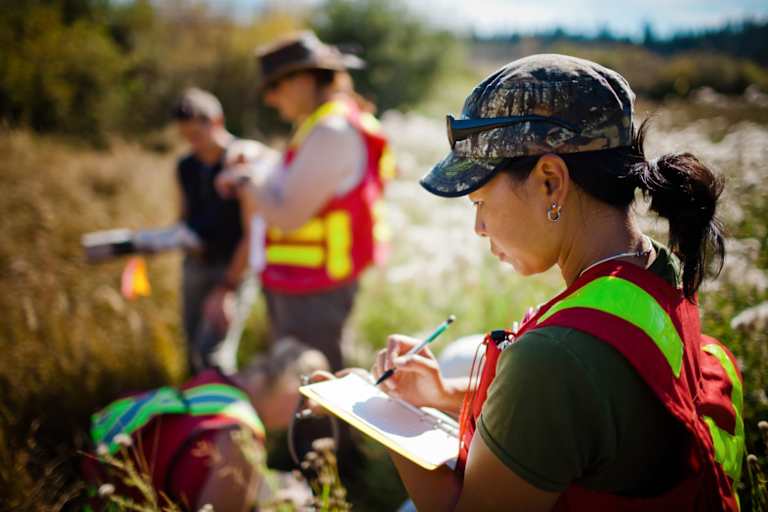What Is STEM? A Complete Guide to STEM Degrees, Jobs, and Salaries

What Does STEM Stand For?
The acronym STEM stands for science, technology, engineering, and mathematics.
STEM includes all fields within each of these four subject areas, such as forensic science and computer engineering.
If you’re considering a STEM degree, be prepared to hone practical skills like critical thinking, problem-solving, innovation, analytical thinking, data analysis, and attention to detail.
With technology advancing to encompass more aspects of everyday life, STEM careers will only continue to grow, making now a great time to get in on the action!
Explore Bachelor’s in STEM Programs
What Types of STEM Degrees Are There?
You can choose from among many types of STEM degrees. While STEM fields often overlap, they’re generally organized into each arm of the STEM acronym: science degrees, technology degrees, engineering degrees, and math degrees.
Science 
Science degrees encompass all physical, life, and natural sciences, such as chemistry, biology, environmental science, physics, and marine biology.
The most popular science degree is biological and biomedical sciences. In 2020, 126,600 degrees in this field were awarded, according to the National Center for Education Statistics (NCES).
In a science program, you’ll learn how and why the world works, whether you’re studying animals, elements, humans, rocks, plants, planets, food, or atoms.
With a science degree, you can pursue careers in research, healthcare, education, policymaking, sports, energy, and even law.
Popular Science Degrees
- Astronomy
- Biology
- Chemistry
- Computer Science
- Data Science
- Earth Science
- Environmental Science
- Fire Science
- Food Science
- Forensic Science
- Health Science
- Kinesiology
- Marine Biology
- Microbiology
- Physical Science
- Physics
- Science Education
- Zoology
Technology 
In our technology-dependent world, technology degrees are, unsurprisingly, some of the most popular STEM degrees.
The number of bachelor’s degrees awarded in computer and information science has increased 145% in the past decade, according to NCES.
Technology is a broad field, encompassing everything from computer programming and software development to information systems management and cybersecurity.
Depending on your type of tech degree, you could pursue a career in software engineering, web development, IT consulting, web design, or computer forensics.
Popular Technology Degrees
- Biotechnology
- Computer Forensics
- Computer Networking
- Computer Programming
- Computer Science
- Cybersecurity
- Database Management
- Health Informatics
- Information Technology (IT)
- Software Development
- Web Design
- Web Development
Engineering 
Engineering is the application of science and math to build, design, and construct structures and machines.
Engineering is one of the six most popular majors for undergraduates, according to NCES. Many students choose to pursue master’s degrees and doctorates in engineering to grow their expertise and advance in their careers.
You can earn many kinds of engineering degrees — mechanical engineering, electrical engineering, civil engineering, marine engineering, and industrial engineering are just a few examples.
With an engineering degree, you can start a career in product design and development, aerospace manufacturing, automotive design and manufacturing, or even robotics research and development.
Popular Engineering Degrees
- Aerospace Engineering
- Automotive Engineering
- Biomedical Engineering
- Chemical Engineering
- Civil Engineering
- Computer Engineering
- Electrical Engineering
- Environmental Engineering
- Industrial Engineering
- Mechanical Engineering
- Petroleum Engineering
- Software Engineering
Mathematics 
Math encompasses everything from calculus and algebra to statistics and probability theory.
In college, you can opt for a general math degree or choose a more specialized path like statistics. Math majors take courses such as probability, differential equations, multivariable calculus, numerical analysis, and linear algebra.
A math degree can lead to a career in finance, insurance, and economics research, as well as in teaching, government, and software development.
Is Architecture STEM? What About Medicine and Social Science?
Architecture is generally considered a STEM field since it involves the application of scientific and mathematical principles to the design and construction of buildings and other structures.
In 2018, Congress officially recognized architecture as a STEM field.
Medicine and health sciences aren’t typically considered STEM fields because they focus on the study and practice of medicine rather than on the application of scientific and mathematical principles.
Nevertheless, certain areas within health sciences, such as bioinformatics, involve technology and data analysis, which could be considered STEM.
Despite having “science” in its name, social sciences — like sociology, psychology, and anthropology — are not typically considered STEM fields, as they mainly deal with human behavior and society.
Explore Graduate STEM Degrees
Does Accreditation Matter for STEM Programs?
Accreditation is important for STEM programs because it ensures that the institution or program meets certain quality standards.
Here’s how accreditation works: Independent agencies evaluate an institution’s faculty, curriculum, facilities, and student outcomes before granting accreditation.
You must attend an accredited school to get certain licensures, qualify for federal financial aid, and apply for graduate school. Accreditation is a way to ensure that the STEM programs you’re interested in are high quality and will help you achieve your career goals.
Legitimate accreditors must be recognized by the U.S. Department of Education and/or the Council for Higher Education Accreditation. You can check the databases on both sites for programs you’re interested in to confirm their accreditation status.
Many STEM programs have programmatic accreditation in addition to institutional accreditation. Here are some STEM programmatic accreditors to look for:
- Accreditation Board for Engineering and Technology (ABET)
- Association of Technology, Management and Applied Engineering (ATMAE)
- Commission on Accreditation for Health Informatics and Information Management Education (CAHIIM)
- Forensic Science Education Programs Accreditation Commission (FEPAC)
- Landscape Architectural Accreditation Board (LAAB)
- National Accrediting Agency for Clinical Laboratory Sciences (NAACLS)
STEM Careers and Salary Outlook
Most STEM careers have a reputation for high salary potential and solid job security. Some of today’s highest-paying occupations are in science and technology.
As a whole, as of May 2021, math occupations had a higher median annual salary ($98,680) and projected job growth (29%) than other types of STEM jobs.
When looking at individual roles, physicist was the highest-earning STEM career as of May 2021, with a median annual salary of $152,430.
Other top-earning STEM jobs include:
- Astronomer: $147,450 per year
- Computer research scientist: $131,490 per year
- Petroleum engineer: $130,850 per year
- Computer hardware engineer: $127,170 per year
- Aerospace engineer: $122,270 per year
- Computer network architect: $120,520 per year
STEM careers are also among the fastest-growing occupations, according to the Bureau of Labor Statistics (BLS). Jobs for wind turbine service technicians are projected to grow 44% over the next 10 years.
Other fast-growing STEM jobs include data scientist (36% projected growth), information security analyst (35%), statistician (33%), and web developer (30%).
Frequently Asked Questions About STEM
 Is STEM a hard major?
Is STEM a hard major?
STEM majors are generally considered to be rigorous. Most STEM degrees involve advanced math and science courses as a foundation. You’ll then apply those math and science concepts to your chosen field of study.
If you’re concerned about the rigor of a STEM program, you may find it easier to earn a STEM degree through a part-time or online program.
 Is nursing a STEM degree?
Is nursing a STEM degree?
Nursing — and healthcare as a whole — isn’t normally considered a STEM degree, but it depends on who you ask.
Despite its roots in science, nursing is usually seen as more of an applied science than as a physical science. For example, nursing degrees may require a lot of biology courses, but there’s little day-to-day biology involved in the nursing profession.
 What is the highest-paid job in STEM?
What is the highest-paid job in STEM?
One of the highest-paying STEM jobs is physicist, with a median annual salary of $152,430 in 2021.
Tech careers are also among the highest-paid jobs in STEM. Computer network architects, for example, made a median annual salary of $120,520 in 2021, according to the BLS. Meanwhile, nuclear engineers earned a median salary of $120,380 per year, and software developers earned $120,730.
 Are STEM jobs worth it?
Are STEM jobs worth it?
A STEM degree provides students with an excellent foundation for any career path they pursue.
Not only will you gain knowledge specific to your field, such as chemical processes or mathematical equations, but you’ll also develop transferable skills, like problem-solving and critical thinking, which are useful in any profession.
A STEM degree can lead to careers at research labs or tech companies, medical school, data analyst positions, and much more.
 What are the fastest-growing STEM careers?
What are the fastest-growing STEM careers?
Information security analyst — for which jobs are projected to grow 35% between 2021 and 2031 — is one of the fastest-growing careers in STEM, according to the BLS.
Other fast-growing STEM careers include statistician (33% projected growth), epidemiologist (26%), computer and information research scientist (21%), and medical scientist (17%).
All STEM Resources

Career Guide for STEM Majors
Careers in STEM are growing fast, and you can take advantage of this in-demand field with a STEM degree. Learn more in our guide.

Accredited Online Associate Degree in Fire Science
An online fire science associate degree can prepare you for an exciting career. Learn more about job options and salary potential with this degree.

Earning an Online Game Design Bachelors Degree
Game design and development degrees prepare students to work on various stages of video game development. This guide is a great starting point for such research.

Online Engineering Courses
Learn today’s engineering skills with online classes EXPERT CONTRIBUTOR Ron Eaglin In a rapidly-changing field like engineering, getting the right education can be critical to staying relevant in the job market. There’s much more to online engineering education than just college degrees; there are also plenty of other online learning options for prospective engineers or …

Earning an Online Fire Science Bachelor’s Degree
A fire science bachelor degree online blends textbook and hands-on learning through field experiences. Classes explore topics like fire laws and safety codes, and fire investigation.

Earning an Online Environmental Science Bachelors Degree
An interdisciplinary field drawing from various social and physical sciences, environmental science focuses on understanding, improving, and protecting environmental systems. As ecodisasters escalate, environmental concern grows, and regulations tighten, demand for environmental science expertise also continues to grow. The Bureau of Labor Statistics (BLS) projects an above-average job growth rate of 8% for environmental scientists …

Best Online Mechanical Engineering Degree Programs
A mechanical engineering degree can prepare you for many high-paying jobs. Learn more about the best online programs for this major.

5 Best Online Information Technology Degree Programs
Interested in an IT degree? Learn more about the top-ranked information technology programs and your earning potential after graduation.

Best Online Bachelor’s in Engineering Degrees
Earning a bachelor’s degree in engineering can lead to new and exciting career opportunities. Here, we list the best online engineering programs.












